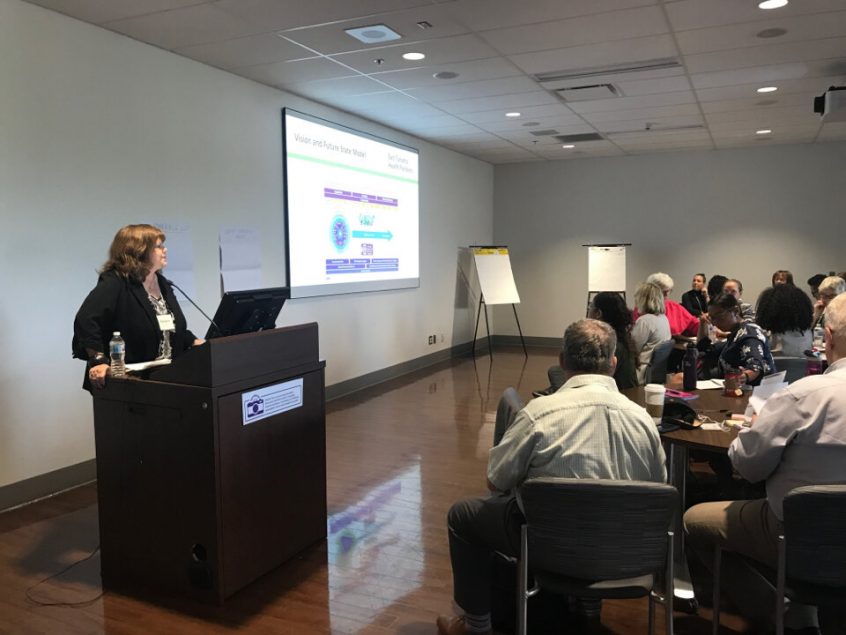Seniors who have chronic illnesses, and their caregivers, is one of the first populations that East Toronto Health Partners (ETHP) identified as a priority for improving care for our Ontario Health Team (OHT).
In 2019, a steering committee that includes representation from numerous health and community care organizations across ETHP was formed to guide this work. One of the steering committee co-chairs, Barbara Cawley, Vice President, Client Services at VHA Home HealthCare (VHA), is retiring at the beginning of July. We thought this transition presented an appropriate opportunity to provide an update and reflect on the work of this group so far.
Early on, the Seniors with Chronic Disease Steering Committee established key areas of focus, supported by smaller working groups. The working group areas include: Asset Mapping and Navigation; Frail Seniors and Caregiver Supports; Integrated Service Model for Toronto Community Housing; Home2Day; Client and Caregiver Engagement and Communications. These groups have largely taken a hyper-local community-based approach, focusing on specific high-needs neighbourhoods, including Taylor-Massey.
Taylor-Massey has 16,000 residents, more than half of whom have limited English and many who live below the poverty line. While there are many agencies providing services to this community, the residents have challenges accessing services, issues connecting with primary care, higher-than-average Emergency Department visits for mental health issues and a high incidence of people in hospital for chronic conditions that could be better addressed in the community.
The Taylor-Massey project has gathered significant data to better understand the care needs and mapped the services that are available to identify gaps. Interviews with residents, agencies and primary care, in tandem with a collaboration readiness survey with agencies providing services in this neighbourhood, have shown the benefits of, and need for, improved communication among agencies and formalized collaboration between health and social service partners. To move this forward, ETHP aims to develop the Taylor-Massey Healthy Communities Framework with clear leadership and accountabilities.
Another project, the Primary and Community Care (PCC) Response Teams initiative, is also designed to improve access and outcomes, primarily for vulnerable adults in East Toronto who are experiencing unmet health and/or social needs. This work is organized around four geographic teams involving 81 individual health and community care professionals working for 19 organizations who collaborated to develop integrated care plans for 186 residents involving 364 service connections from April 1, 2020 to March 31, 2021.
“The level of engagement across the response teams has been very high,” shared Lori Sutton, Project Facilitator for the PCC Response Teams. “Eighty-one per cent of team members reported that this approach led to improved access for their clients and increased their cross-organizational collaboration and knowledge of resources in the community.”
“The excellent work done on the PCC Response Teams and Taylor-Massey projects are great building blocks to help us integrate care and improve access for our residents,” added Anne Wojtak, ETHP Lead. “They are perfect examples of what can be achieved when our partners and community members work together to achieve a shared goal.”
Other key initiatives for ETHP’s Seniors with Chronic Disease Steering Committee include:
-
Teaming up with ETHP’s Digital Health Steering Committee to explore a collaboration with the 211 Healthline to improve awareness of services in the community;
-
Significant partnership work in Toronto Community Housing buildings to develop connections with residents, including offering COVID-19 vaccines door-to-door; and
-
Increasing engagement and supports for residents in naturally occurring retirement communities.
Going forward, a key focus for the steering committee will be to help align and integrate these activities. As Barbara Cawley begins her next chapter, Mary Eastwood, who was formerly in the role of Director, Strategic Initiatives, Community Care Unit at WoodGreen Community Services, will be playing a key role as Project Lead for these working groups and for the Taylor-Massey project. Courtney Bean, Vice President, Integrated Care, Private Services and Partnerships at VHA, will also be joining the steering committee in Barbara’s stead.
“I feel fortunate to have had the opportunity to work with this amazing group of knowledgeable, committed and caring people from all across our sector and to see the progress that is already being made to better integrate care,” Barbara shared. “It has been such a pleasure to work with my super smart and incredibly kind co-chair, Dr. Kevin Workentin, Chair of Family Medicine at Michael Garron Hospital (MGH), and we couldn’t have got this far without the crucial support of Anne Wojtak and Margery Konan, Senior Project Manager at MGH and VHA.”
“Barbara is the poster person for how Ontario Health Teams are supposed to work. I don’t know anyone who works more collegially and in a more dedicated way in the spirit of partnership and collaboration,” said Dr. Workentin. “Barb’s energy and enthusiasm for all we could achieve together kick-started this work and we’re determined to keep that spirit alive as we work together to make care better for the people of East Toronto.”

